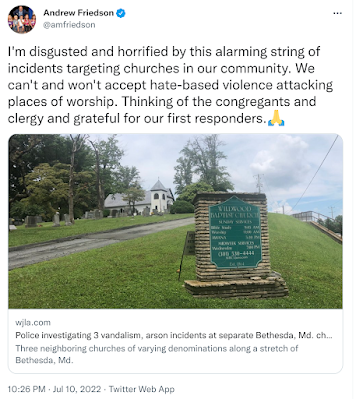Montgomery County is in the midst of one of its most-embarrassing, and potentially most-earth-shaking, political scandals ever. But you wouldn't know it listening to the County Council. The Council has heard a barrage of rumors, accusations, explicit allegations - and even some admissions - of improper or illegal activity within the County Planning Board and Planning Department over the last several weeks. After
initially taking no significant action, when the matter reached the verge of going nuclear, imploding the County political machine, and threatening the passage of the controversial Thrive 2050 plan, the Council stepped in and
demanded the resignations of all five planning commissioners. According to the Council, that's the end of the story.
"Not so fast," some are saying. In fact, that's an exact quote from just one critical voice opposing the Council's intention to sweep planning corruption under the rug, the Bethesda African Cemetery Coalition. Their press release calls for something we needed years ago: an independent investigation of the current and past Planning Boards, and of the Planning Department itself. It cites a number of ways planning in Montgomery County has impacted African-American residents over decades, including its chief policy concern, the ongoing desecration of Moses African Cemetery by real estate interests since the 1960s, and the Planning Department's documented attempts to cover it up during the Westbard sector plan process.
BACC's response is an interesting place to start discussing the planning scandal, because so many of the controversies at the department have been racial in nature. Farm Road. The white Planning Board chair repeatedly calling in as many as eight police officers on protesters from a black church at multiple meetings, even after the phenomenon of whites calling the police on blacks had become a national discussion.
What little we know about the latest controversies only adds to the impetus for further investigation. Who were all the individuals drinking with Chair Casey Anderson in his office bar? Were unreported ex parte communications a part of these happy hours? How much input on Thrive 2050 was offered over cocktails?
Incredibly, The Washington Post - The Washington Post!! - could not confirm this week where just-resigned Board commissioner Partap Verma is currently employed. That is a critical point, as this must be disclosed by every commissioner when they apply, and in ongoing filings. This does not mean Verma is up to something nefarious, but that there is a breakdown of ethical and accountability protocols at the department. If current employment could be hidden by commissioners, they could be working for a developer with business before the Board, and the public would have no idea.
That matter was raised by the Post after Verma was allegedly accused of violating the Hatch Act, and doing so to assist active nominees for County political offices on the November ballot. This is another area to be fully investigated.
County Executive Marc Elrich released a statement Wednesday correctly saying that "[t]his cannot be the end of the conversation on the dysfunction and structural issues at Planning." He cited some of the past transgressions of the Board, including violations of the Open Meetings Act. A vote on Thrive 2050's passage should be delayed until racial, equity and community feedback matters have been fully addressed, Elrich added. He endorsed the Council's own equity consultant's argument that “compressed timeframes are the enemy of equity.”
While the Council will likely appoint new commissioners from the same political stew - if allowed to by the press and others in positions of power - Elrich called for a sea change in how the board is composed. "It is clear that new people and new voices are needed on the Planning Board," Elrich wrote. "Park and Planning has been run by a group of insiders for far too long. There needs to be a respectful balance of the views of developers and those of the community. I hope that the new Planning Board appointees reflect the demographics of this community and are committed to our residents, community input, and an efficient and transparent process."
Elrich's Republican opponent in November's election, Reardon Sullivan, released a statement citing Planning Board misbehavior, and the lack of accountability. "Our unchecked County government officials have been unaccountable for far too long," Sullivan said. "The shameful history of the Planning Board includes public infighting, questionable behavior, and multiple violations of the Open Meetings Act. Furthermore, their expedited actions to push through Thrive 2050, without proper review and input from the community, is characteristic of this body that was nominated and approved by the leadership in Montgomery County."
"Is there something you don’t want us to know?" tweeted EPIC of MoCo, an organization of residents who oppose Thrive 2050. "If you’ve lost confidence in the Board, we deserve to know why and why you have confidence with [Thrive 2050], created by a flawed process in a hostile environment?"
Perhaps the most informative response to the scandal, for those seeking to determine whether the Council should be allowed to consider the planning debacle closed, is an article by local political commentator and blogger Adam Pagnucco, on his new Montgomery Perspective blog. It's a perspective residents should familiarize themselves with quickly.
A former County Council staff member, Pagnucco is as close to an official voice as you can get for the most powerful faction of the Democratic Party in Montgomery County. If you want to capture the zeitgeist of the day within the County political machine, you turn to Pagnucco. If you're a fan of Marc Elrich, and part of the most-progressive wing of the Democratic party, you do not.
What makes Pagnucco's piece so valuable is not his blow-by-blow recounting of the Planning Board fiasco. It's the list of grievances and fears within the Montgomery County political cartel that he candidly reveals. It's a list that only compounds the need for a full investigation.
The undercurrents within Pagnucco's report are gushing and undeserved praise for a County Council that waited to act until the situation became the latest regional embarrassment for the County, and a hint of relief that the resignations will negate the need for further investigation of the Planning Board and Department, and allow for quick Council approval of Thrive 2050 later this month.
From this insider viewpoint, we can conclude that, for the Council and their campaign contributors, nothing can stand in the way of approval of Thrive 2050. And that the Council feels their eviction of the Planning Board commissioners ends this chapter, without any investigation of past transgressions by the Board and Planning Department, much less the many accusations reported or hinted at during the last few weeks.
The reality is, the public knows very little about Thrive 2050, a plan that would allow existing single-family home neighborhoods to be bulldozed, for the construction of duplexes, triplexes and small apartment buildings. It would destroy the neighborhood character homeowners paid good money for, reduce green space and increase pollution and runoff amidst an environmental crisis, jam streets with more cars than there is space to park, and multiply school overcrowding by as much as 4 times. But it will greatly profit the developers who fund the campaigns of the County Council.
Yet the Council is now in the untenable position of having to approve a Thrive 2050 plan that was developed by five people they just declared they have no confidence in. If you have no confidence in the authors of a plan, how can you have confidence in the plan they wrote or edited every single word of?
Most intriguing of all, is Pagnucco's discussion of another fear within the Council and real estate development community that I've never heard discussed before. Namely, that Elrich was supposedly plotting to seize control over the Planning Board's functions, folding them into his office's portfolio. I have never heard Elrich express this desire publicly, but I actually hope he was planning (pun intended) to do this, and acts to do it soon.
As Pagnucco explains, Montgomery and Prince George's County are outliers in delegating this planning authority to ostensibly-independent authorities like the Maryland National Capital Park and Planning Commission. Both counties just happen to have a long history of planning scandals, and ultra-cozy ties between real estate developers and elected officials. Much like our County government liquor monopoly, we should not be surprised that an unusual, self-serving, and corrupt method of governance is delivering such poor results for the taxpayer and public good.
Elrich should step up, and step in, now. Pagnucco writes that the Council's fear is exactly that, and that Elrich would use the current scandal to justify such intervention. Well, Elrich would indeed be justified, and has the moral high ground. Whatever criticism there is of his policies, he is one of the most honest politicians in the County.
Regardless of whether Elrich acts in that direction, this can't be the end of the scandal. Certainly, The Washington Post and local television stations need to keep the heat on the Council, to explain why they think the resignations are the end to a decades-long and very sordid story. But an FBI investigation is long overdue, as well.
One has to wonder what friends in high places in federal law enforcement the County's political cartel has, that we've avoided an FBI investigation all these years. The Bureau usually steps in after just one scandal breaks, believing correctly that such matters may be the mere tip of the corruption iceberg in a local government. But through a non-profit's inability to account for $900,000 in taxpayer money, the embezzlement of more than $6 million from the County government by at least one employee, Farm Road, the Department of Liquor Control scandals, and the cover-ups in the Westbard sector plan process, Burt Macklin and his colleagues have yet to show up on the doorsteps of County facilities. If only we had such friends in the Pentagon, maybe we wouldn't have been so royally steamrolled by BRAC in Bethesda.
Now isn't the time to sweep dirt under the rug. It's time to start turning rocks over. All of them.





































